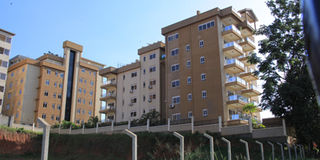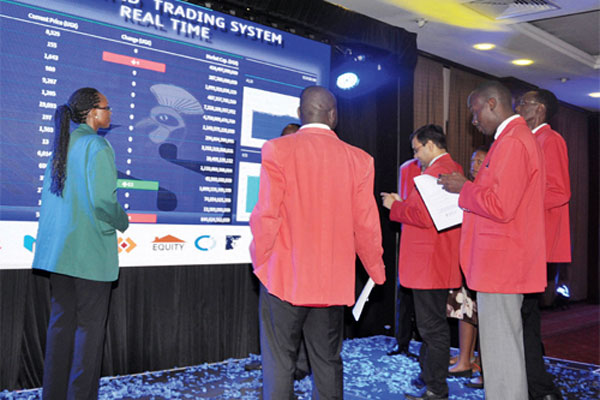Where you own a unit in building with master title: How this works

Apartments constructed under the condominium arrangement in Kampala. Condominiums are considered among the best modes of accommodation for those who want to stay in the city while optimally using land in Uganda. Photo by Rachel Mabala
Five years ago, Annet Babigamba decided to join the real estate business. She had tried both building and construction before diverting into condominiums.
She believes that buying a condominium is also known to be cheaper than building a house because it does not require supervision.
“You do not have to supervise a thing when it comes to owning a condo. The hassle of walking back and forth to sites to monitor and supervise work is minimised,” Babigamba says.
She adds: “Unless you have the money to build a house within the shortest time possible; it can take you as long as 20 years to construct your dream house.”
In addition, construction is one of the most expensive ventures in Uganda. For instance, right from getting genuine land, we have seen cases of people buying ‘air’, raw materials, even financing; those planning to build out of the city
However, she notes that rather than take 20 years trying to build your dream house, you can narrow down the budget to a condo since it can cost over Shs200m to buy your dream house.
Babigamba now a sales executive at Universal Multipurpose Enterprises-a project developer, says people are learning about the condominium especially those who do not want to live in slums.
A condominium is a form of multidimensional apartment building, where specified units are separately owned, with the shared space such as corridors, parking space, security, recreation areas (Rooftop, green area), drive way and parking are collectively owned. There is no individual ownership of land in condominiums.
Babigamba adds: “We are trying to eliminate slums especially for middle income earners, with relative and flexible payment terms to acquire a condominium.”
Low-cost options
Although no project developer has come up with low cost houses, most of them (project developers) are ensuring that the houses are affordable, majorly targeting the middle income earners.
However, project developers hope to set up low cost houses to cater for the low-income earners.
This, they say, can be achieved if they acquire land such as an industrial park that can accommodate upto 100 units to address Uganda’s housing deficit.
According to Uganda Bureau of Statistics (UBOS), Uganda’s population is projected to grow to 41.2 million by 2020. Yet the country currently has a housing deficit of about 1.2 million units, with Kampala alone having a staggering deficit of more than 200,000 units.
By 2030, the deficit is expected to reach three million units on account of the rapid urbanisation rate and a high population growth rate of 3.2 per cent per annum.
According to the 2018 Revision of World Urbanisation Prospects produced by the Population Division of the UN Department of Economic and Social Affairs, the world’s population living in urban areas is projected to rise to 68 per cent by 2050 from 55 per cent in 2018.
Babigamba says since the condominium was started five years ago, about 2,000 units have been sold out. She is optimistic that approximately 3,000 units will be sold out by the end of this year.
Babigamba says they have earned over $36m (about Sh111 billion) within five years.
She further adds that condominium arrangements has largely been embraced by people in the diaspora because they had challenges such as fraudsters who divert their construction money for their own benefit.
She says: “People living in the diaspora can own property with less hassle. They can rent out their property when away.”
Who owns title?
Vincent Agaba, the managing director at AVARTS Housing Ltd, explains that under the condominium arrangement, each unit owner is given a title to the purchased units but there is also a master title.
“The key disparity between condominiums and ordinary built houses is that no one owns the land that the condos sit on. The condominium project in an area is owned jointly by all the homeowners,” he said.
Agaba added; “We can call it a vertical construction concept and the main aim is to optimally use the land instead of land fragmentations. Also, land owners will enjoy the economies of scale such as having to build one rooftop for apartments.”
He explained “If you are going to build eight apartments and you were to roof each; that would be costly. Condos also promote organised living where landscaping and parking are all done together.”
Challenges
The sector is faced with inadequate financing. Most people neither have access to finances nor qualify for mortgages.
Babigamba notes that they decided to consider setting up affordable housing since an average Ugandan earns between Sh500,000 and Shs1m.
“For a single unit that costs Shs90m in Najjera, paying Sh5m per month for an average Ugandan is not cheap. We encourage people to go to the bank and acquire mortgages of over 20 to 21 years,” she explains.
She adds that they have partnered with banks such as Housing Finance, Stanbic, Centenary, Absa, Bank of Africa and DFCU.
In addition, she notes that most people are not realistic about their background.
“Some people grew up in small houses but pretend to want to live big. This is why a number for people think condos are small; but in reality, a bachelor or spinster in their 20s or 30s can comfortably own a home,” Babigamba says, adding, “All you have to do is play around with the space that will suit your desires.”
Advantages
Joanita Muwema, a sales executive at Fakhruddin Properties, said it is the best accommodation for those who want to stay in the city and a way of optimally using land in Uganda.
“A small piece of land can accommodate many units. Land is limited; two, nobody owns the land. Those things of I have bought ‘air’ and running around to get title deeds are left for the developer,” she said.
Muwema also explained that social amenities such as security, access roads, parking, children playground, supermarkets and swimming are shared hence making the costs of living go down.
Dan Mukiibi, a real estate broker in Makindye Division, said a number of people are opting for condominium property ownership instead of renting an apartment.
“Living in a condominium property means there is sharing of responsibility for instance in the costs of repairs and maintenance,” Mukiibi explained.
Bugolobi and Bukoto flats can be the best example of Uganda’s oldest condominium setting.
However, other developers have set up condominium properties for sale, especially in areas around Najjera, Namugongo, Luzira, Kira, Mbuya and Naalya. Other areas include; Kyambogo.
Mr Faizo Dikane, a real estate manger along Entebbe Road, says people believe condominiums are not only affordable and easy to maintain for middle–income earners but they are also often priced slightly lower than the single family homes.
Adopting to condominium
Ms Muwema admitted that this is a new building concept and Ugandans are slowly taking up. But there is need for more awareness before Ugandans can accept it.
“This concept is used by our neighbours like Kenya and Rwanda. So it can also be adapted here,” the Fakhruddin Properties sales executive said.
Ms Claire Kateregga, customer relationship manager, Build Net, notes that with condominiums, the main title is taken to the Lands Office. The mother title is a Mailo land title which is handed to the Condominium Association head.
“The title will show that if a ground floor has four units, each unit will be owned individually. Those days people feared having a title deed kept by one person,” she said.
Ms Kateregga added; “Being an individual property owner guarantees you to do all you want with the interior design. But with the exterior design, you must collect everyone’s ideas.”
Management
She further added that as a property developer, under a condominium agreement, owners form a condominium association where they select the head of the association, secretary and treasurer.
It is through the association heads that condominiums are managed. These ensure that cleaning, garbage collection and electricity dues are collected. Every person is expected to pay a monthly fee to cover the expenses.
Condominiums have a reserve fund - the amount of money the association sets aside to make repairs on the shared property.
But the public should be sensitised about the Condominium Property Act (2001). Investing in Condominium Properties helps optimise on use of land and economise on the cost of infrastructure.
Considerations
Accessibility; a condo is constructed near a tarmac road
Surrounding / neighbourhood should have schools, market, hospital.
Babigamba says they do not do luxury finishing because different clients have different tastes and preferences.
She is quick to note that they have affordable houses around Kololo at Shs250,000. Some of the houses previously cost between Shs45m to Shs70m.
If the place is far and experiences more traffic, there are higher chances of lower rent charges.
Cost
For instance, condominiums are famous in areas such as Kira, Naalya, Najjera, Kololo, Muyenga, Namugongo and Bukasa.
What makes a condo unique is that it is tailored to suit all designs. It is either a one-bedroom, two or three-bedrooms.
costs vary from developer to developer.
Area Cost
Muyenga $500
Najjerea $600
Naalya $700
Namugongo $500
UNIT COST
One-bedroom Shs96m
Two bedroom Shs172m
Three bedrooms Shs189m
Payment terms
A person deposits Shs5m (flexible amount). He /she can pay a 30 per cent cash down payment within the three months and the balance over a period of 18 months. There are various financing options to get condominiums.
“You can pay cash, use special payment plans with developers or get a mortgage with banks. For arranged payments, you get a unit and clear in a year or two. With banks, you can get a mortgage that can run up to 20 years but you will be paying interest,” she said.
According to a 2016 survey done by Bank of Uganda (BoU), residential mortgages were priced at an average of 22.02 per cent while commercial mortgages attracted 21.81 per cent at an annual interest.
Weighing in on affordability, Mr Agaba said they are quite affordable where an apartment can go for as low as Shs270m; an amount he said cannot build a stand-alone house.
“Affordability goes with mass production; just like commercial farming verses subsistence where mass production causes the prices to drop; the costs go down when more units are put up at a go, with time, the condos end up becoming cheaper,” Babigaba said.
Citing an example if a unit is Shs90m; a person will pay 20 per cent initial payment of Sh18m. The balance which is 80 per cent of the purchase is paid in instalments for a period up to 12 months.
She notes that this plan is negotiable especially to someone who may not afford to pay Sh7 million a month.
If you do not have Shs18m at the moment but want to put it on the market, you book with Shs5m which is deducted off the Shs18 million.
“There is also financial support from the bank to clear the debt which is done within 12 to 15 months. Property developers do not charge interests until the debt is cleared,” Babigamba said.




